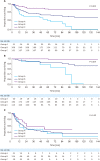The Impact of Preoperative Low Body Mass Index on Postoperative Complications and Long-term Survival Outcomes in Gastric Cancer Patients
- PMID: 30276004
- PMCID: PMC6160530
- DOI: 10.5230/jgc.2018.18.e30
The Impact of Preoperative Low Body Mass Index on Postoperative Complications and Long-term Survival Outcomes in Gastric Cancer Patients
Abstract
Purpose: The aim of this study was to investigate the impact of preoperative low body mass index (BMI) on both the short- and long-term outcomes in patients with gastric cancer.
Materials and methods: A total of 510 patients with gastric cancer were divided into the following 3 groups: low BMI group (≤18.5 kg/m2, n=51), normal BMI group (18.6-24.9 kg/m2, n=308), and high BMI group (≥25.0 kg/m2, n=151).
Results: There were significantly more stage III/IV patients in the low BMI group than in the other groups (P=0.001). Severe postoperative complications were more frequent (P=0.010) and the survival was worse (P<0.001) in the low BMI group. The subgroup analysis indicated that survival was worse in the low BMI group of the stage I/II subgroup (P=0.008). The severe postoperative complication rate was higher in the low BMI group of the stage III/IV subgroup (P=0.001), although the recurrence rate and survival did not differ in the stage III/IV subgroup among all the BMI groups. Low BMI was an independent poor prognostic factor in the stage I/II subgroup (disease-free survival: hazard ratio [HR], 13.521; 95% confidence interval [CI], 1.186-154.197; P=0.036 and overall survival: HR, 5.130; 95% CI, 1.644-16.010; P=0.005), whereas low BMI was an independent risk factor for severe postoperative complications in the stage III/IV subgroup (HR, 17.158; 95% CI, 1.383-212.940; P=0.027).
Conclusions: Preoperative low BMI in patients with gastric cancer adversely affects survival among those with stage I/II disease and increases the severe postoperative complication rate among those with stage III/IV disease.
Keywords: Body mass index; Obesity; Stomach neoplasms; Underweight.
Conflict of interest statement
Conflict of Interest: No potential conflict of interest relevant to this article was reported.
Figures


References
-
- Kim JP. Current status of surgical treatment of gastric cancer. J Surg Oncol. 2002;79:79–80. - PubMed
LinkOut - more resources
Full Text Sources

